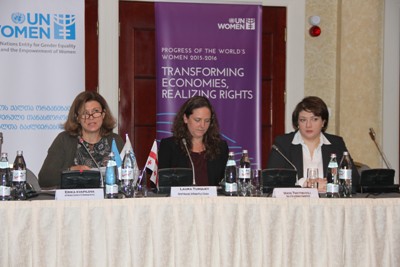Sexual Harassment Restricting Women’s Economic Empowerment
Date:

UN Women launched its Progress of the World's Women Report; Photo: UN Women
In their opening remarks, UN Women Country Representative in Georgia, Erika Kvapilova and the Head of Government Administration, Maia Tskitishvili both highlighted that the economic empowerment of women lies at the heart of gender equality; and that gender equality lies at the heart of sustainable development.
The Global Flagship Report 'Progress of the World’s Women 2015-2016: Transforming Economies, Realizing Rights' asks what the economy would look like if it truly worked for women. One of the answers given during the UN Women launch event was: "A workplace free from discrimination and harassment". During her presentation of the report, Laura Turquet (Progress of the World's Women Report Manager at UN Women) stated:
55% of women in the EU have experienced sexual harassment, and as many as 75% of women in top management positions. Employers need to create a zero-tolerance policy against sexual harassment, and training and awareness-raising are effective measures to change attitudes, especially with men.
Sexual harassment was also the topic of the subsequent panel discussion. The panel brought together representatives of ILO in Georgia, the Public Defender’s Office, Georgian Employers Association, the Georgian Trade Union Confederation and the NGO Partnership for Human Rights, to discuss this issue from different angles. Zsolt Dudas, Chief Technical Adviser of the ILO, stated that:
“Sexual harassment functions as a barrier to women’s employment. The Labor Code is not a sufficient regulation for this issue; there are no sanctions and no labor inspections to ensure enforcement”.
Ekaterine Skhiladze, Head of the Gender Equality Department of the Public Defender’s Office, stressed that reporting and identification of sexual harassment is also a big challenge: “It is a taboo issue; women do not speak out about sexual harassment, because if they do they get the blame. The trade unions and labor organisations can play an important role in increasing awareness”.
This was reiterated by Mikheil Kordzakhia, Vice President of the Georgian Employers Association, who said that the two issues of sexual harassment and the pay gap between women and men are alarming: “We need to raise awareness among businesses, identify the root causes and eradicate them”.
Several of the speakers highlighted the need to amend legislation to make sexual harassment prevention and response possible; and to remove taboos through the active involvement of labor inspectors, employers, trade unions and civil society, as well as the Government and international organisations.